1857 – National Association of Baseball Players founded in New York
Captured!
Enter now to win a copy of
Thunder Over the Prairie:
The Story of a Murder and a Manhunt by the
Greatest Posse of All Time
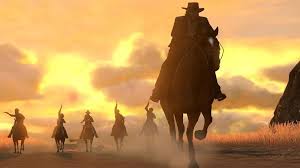
James squirmed uncomfortably in the saddle and slowed his horse from a fast trot to a walk. The renegade’s attention was fixed on the countryside that unrolled before him. There were miles and miles of open range as far as he could see. The sky directly above was clear with fuzzy pinches of cotton-like clouds scattered here and there, but dark thunderheads were piling up a few miles out. He led his ride around the bones of a buffalo that had fallen some time prior to his passing through the area, and the horse balked and snorted. The mount was apprehensive about moving forward. James strained his eyes over the rugged trail, but failed to see anything that warranted the horse’s obstinate behavior. He poked the animal with his spurs, and the horse continued on.
Bat peered over the mound of earth he and the other posse members were positioned behind and watched the fugitive they’d been pursuing draw slowly nearer. “We’ll stop him out here,” Wyatt announced. “I don’t think he’ll make a fight. Most likely he’ll run for it.” “If he does… I’ll drop him,” Charlie promised. “Kelley wants Kenedy alive,” Bill reminded the men.
Charlie looked around for their horses and noted that the animals were scattered about the vicinity – too far away for the lawmen to reach without being seen. “Damn-it,” Bat spat under his breath realizing along with Wyatt and Bill the location of the mounts. “I’ll attend to the man,” Bat told his fellow riders after contemplating the distance a bullet would have to travel to hit James. “If he runs, shoot his horse,” Bat ordered Wyatt.
James rode on lost in thought. The closer he got to the acres of pastureland outlining the sod house, the more nervous his horse became. The animal raised his head and neighed. James surveyed the region and again saw nothing out of the ordinary. He kept going, but stopped every few yards to make sure the way was clear. Seventy-five yards away from the posse’s location, James brought his ride to a stop. He could hear only the cold wind blowing over the withered grass.
He scrutinized the prairie for a third time and noticed four rider less horses milling about. Anxiety swelled to fear and broke out on him in a cold, clammy sweat. A charged silence descended on the spot as the outlaw and the posse held their positions like graven images, waiting for someone to make a move. James’s face was bloodless and in one quick simultaneous motion, he removed his gun from its holster and swung his horse around.
Wyatt, Bat, Charlie and Bill jumped up and leveled their weapons at James. “Halt,” Bat shouted, cocking his weapon. James was defiant. He fired a shot at the same time he dug his spurs into his mount’s sides. The animal launched into a hard gallop. “Halt,” Wyatt warned the killer again. James refused. “Last chance, Kenedy,” Wyatt warned, “Halt!” James raised his whip to strike his ride and urge the horse to go faster, but a bullet fired from Bat’s .50 caliber rifle struck his left arm and he dropped the quirt. Thoroughly spooked by the violent exchange, the horse hurried to escape the scene. The lawmen let loose a volley of shots. Wyatt took careful aim and fired at James’s horse. Three bullets brought the animal down. James fell out of the saddle just as his mount received the fatal blow and the horse landed hard on top of him, crushing the arm that had just been shot. Horse and rider lay motionless on the ground.
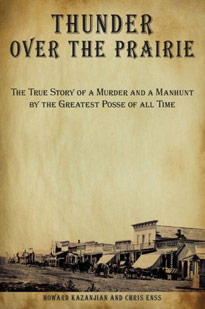
To learn more about the posse that tracked down
Spike Kenedy read Thunder Over the Prairie.
This Day…
1945 – Franklin D. Roosevelt sworn-in for an unprecedented (and never to be repeated) 4th term as US President.
Beyond the River
Enter now to win a copy of
Thunder Over the Prairie:
The Story of a Murder and a Manhunt by the
Greatest Posse of All Time.
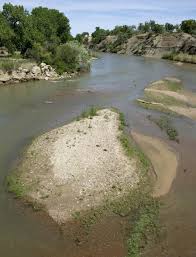
Fog and a heavy morning mist danced across the wet scrub and brush grass that stretched toward the sun. The posse rode through the somewhat eerie scene without speaking. Their faces a study of relentless purpose, their every sense alive and straining. Their keen eyes searched for vegetation that had been trampled, twigs that had been broken, ground that been packed down, remnants of clothing, any sign that a desperate rider had passed through the area.
Wyatt Earp leaned slightly out of his saddle to study the terrain and the crude path they were following. His expression was resolute and competent. He sniffed at the wind that began to rise and coaxed his horse into a trot beside Charlie Bassett’s and Bill Tilghman’s roans. The men rode three abreast spurred on by an unspoken belief that they were headed in the right direction.
Bat Masterson lingered behind the others, glancing back over his shoulder at someone he felt was following them. Wyatt caught a glimpse of Bat bringing up the rear and pulled back on the reins of his mount, turned the animal around and rode towards the lawman. “Bat,” Wyatt said, scanning the surroundings cautiously. Bat smiled at Wyatt, but behind the smile was a look of uneasiness. “Remember when we were hunting buffalo?” Bat asked. Wyatt nodded. “We’d find a spot up wind of them and pick them off one by one,” Bat continued. “They never even stampeded when members of their herd began dropping. Not so long as they didn’t get a whiff of the hunter. All we had to do was make sure we stayed out of smelling range and drop each animal with one shot.” Wyatt peered warily into the distance they’d traveled. The significance of Bat’s memory resonating in his head. Bat walked his horse past Wyatt’s animal. “All we had to do was stay out of smelling range,” he repeated as he rode by. Wyatt gave another guarded look over the countryside then fell in after Bat.
In the two years Wyatt and Bat had served together as lawmen in Ford County, they’d had numerous run-ins with rowdy Texas cowhands. Both men knew any of those vengeful drovers and their crew could be just out of sight waiting to gun them down.
There were most assuredly rogue Indian braves, either Cheyenne or Comanche, keeping a watchful eye on the posse, but the policemen didn’t believe they were a threat. The bulk of the Plains Indians had been confined to reservations and generally would not launch an attack unless provoked. If there were anyone lurking beyond the tall grasses and iodine bushes, anyone following the lawmen using the crevices in the earth for cover, it was presumed to be the cowpunchers from the Kenedy family ranch. “They’re on their way,” Bat said, referring to James Kenedy’s fellow drovers.
After eight years in law enforcement, Wyatt Earp knew the risks and sacrifices that came with keeping the peace. Many of his friends and acquaintances insisted he was born for the job. One of the men who hunted buffalo with Wyatt recalled that he had “absolute confidence in himself that gave him an edge over the run of men.” Bat Masterson regarded him as someone who was “absolutely destitute of physical fear.”
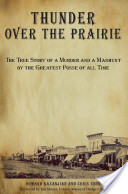
To learn more about the posse that tracked down Spike Kenedy read
Thunder Over the Prairie.
This Day…
Caught In A Storm
Enter now to win a copy of
Thunder Over the Prairie:
The Story of a Murder and a Manhunt by the
Greatest Posse of All Time.
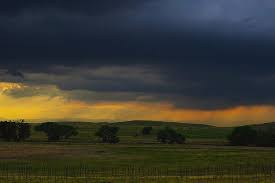
A pile of coal black thunder clouds unleashed a torrent of cold rain on the posse’s crude camp. The canvas lean-to tied to boulders jutting out of the bank of a stream, sagged with the weight of the water. Lightening pulsated, reflecting off the faces of the four lawmen waiting out the storm. They were tired, but resolute. A turmoil of wind blew rain into their poor excuse for shelter and splashed off their hats and slickers. “If any of you know where that ark is tied up, you might want to make your way for it now,” Bat said jokingly, his voiced raised over the weather. His fellow riders chuckled politely as he removed a soggy cigar from the breast pocket of his coat. He played with the wet stogie for a minute trying to convince himself that it could be lit. All at once any attempt to fire it up seemed foolish, and he threw the cigar down on the ground beside him. “Damn it all,” he said folding his arms across his chest.
None of the men were surprised by the water-logged conditions. The hot, dry Kansas summers could blister the paint off any building and the wet, cold winters that came behind it could scour it down to raw timbers. Prairie fires ignited by lightening scorched everything in its path and flash floods carried it all away. Members of the intrepid posse had experienced all the harsh seasons the territory offered. The forces of nature had shaped them and made them more resilient. They drifted in and out of a fitful sleep, hoping each time they opened their eyes the relentless rain would have stopped, and they could be on their way.
“The Lord sure must have pulled the cork,” Bat said noticing everyone was struggling to drop off. “I rode in rain like this for six days,” Bill said after giving Bat’s comment a decent moment of thought. “I was driving a herd of cattle for Mart Childers through Cheyenne country.” The conversation was a welcomed distraction from their attempts at slumber. Charlie, Wyatt, & Bat focused their attention on Bill. “The prairie sod was a quagmire,” he continued.

To learn more about the death of Dora Hand and the posse that tracked her killer read Thunder Over the Prairie.
This Day…
1915 – US House of Representatives rejects proposal to give women right to vote.
Hell Rides with Them
Enter to win a copy of
Thunder Over the Prairie:
The Story of a Murder and a Manhunt by the
Greatest Posse of All Time.

A crowd of Texas trail hands watched the prairie hurry past them as they pressed their rides into a full gallop. A whistle from a train racing in the opposite direction issued a long blast that floated over miles of grassy fields. Dr. Henry Hoyt, part-time cowboy and physician for the King Ranch, was out in front of the riders, an unlit cigar was clamped tightly between his jaws. Like the others on horseback beside him, he was dressed in rough clothing of the cattle trail. His tall hat was pushed back from his sunburned face. When he and his cohorts left Dodge City, they had in mind to intercept the posse pursuing James Kenedy and give the wealthy cattleman a chance to get out of the territory safely. Shortly after they started on their way, it was decided they should return to the ranch in southern Texas and inform James’s father about the incident involving his son.
The King Ranch, located between Corpus Christi and Brownsville, sprawled across six Texas counties. Hundreds of hands worked the more than twelve-hundred-and-eighty-mile spread. Dr. Hoyt suspected when Mifflin Kenedy learned about the trouble James was in, that he would dispatch a legion of dutiful men, indignant over the harsh treatment of a fellow Texan. Hundreds of discontented cowboys who believed their occasional, illegal actions deserved a free pass because of the hundreds of dollars they spent in Dodge, would go to great lengths to champion one another. Dr. Hoyt knew this and knew that Captain Kenedy was aware of it as well. Mifflin’s organized efforts on behalf of his son would be more effective than 25 or 30 rogue hands acting independently. It was with that thought in mind that Dr. Hoyt and friends headed off in the direction of the Chisholm Trail towards home.
A cold wind hissed through the cracks of the walls and doors of a sprawling, dilapidated mud and wood store near a place called Mulberry Crossing, 27 miles south of Dodge City. With the exception of an inebriated trail hand, the dusty stretch in front of the business was deserted and still. A weathered sign over the entrance read, A.H. Dugan, owner. Dugan, a heavy man who had sagging jowls and thinning black hair combed across his sweaty scalp, ran the stage stop which was a combination mercantile and saloon. He was wiping a mop rag over a rugged wood table when Bat Masterson and Bill Tilghman entered. Three riders with the look of seasoned cattlemen and the sound of Texas in their voices, were seated in the back of the room and looked up from their poker game at the police officers. The tension in the air seemed almost visible.
The cowboys continued on with their game as Bat and Bill meandered over to the bar. “It’s two bits for a bucket of water for your horses,” Dugan said, blowing the dust off a can of peaches and putting them back on the shelf. “We’re looking for someone who might have come by here,” Bat stated. “It’s still two bits,” Dugan replied unimpressed. The lawmen politely explained who they were looking for and described James Kenedy. Dugan told them no one that looked like Kenedy had been through. “And I would know,” he added. “I know every teamster, trail hand, and stage driver that passes by.”
Bat turned his attention to the men playing cards. The cowboys were too engrossed with their hands to care. Dugan told the officers that the ranchers were part of a nearby spread that had come in to load up on provisions and decided to stay for a game and a bottle. Satisfied with the response, Bat and Bill turned to leave. “What did this fellow do?” Dugan asked before the men reached the door. Bill told him that he’d shot a woman in Dodge. “She was a singer,” he elaborated. “Her name was Dora Hand.”
Dugan’s expression fell. He removed a bottle of cheap liquor from under the counter and poured himself a drink. “Damn shame,” he said sadly as he lifted the glass to his lips. “My sister dragged me to the Union church some months back,” Dugan confessed. “Miss Hand sang a solo. Prettiest thing I ever did hear.” The gruff businessman hummed a bit of the hymn he was recalling before asking Bill if he had known Dora. “Yes,” Bill kindly answered, “I knew her.” Before exiting the building, Bat warned Dugan and his patrons not to say anything about their passing through. “When you find the murderer, I hope you kill him,” Dugan snapped. “It may come to that,” Bat promised.
Wyatt and Charlie, who had been surveying the area around the primitive store, hopped aboard their horses at the same time Bat and Bill mounted up. Charlie let them know they hadn’t had any luck finding Kenedy’s tracks. “I think we need to get a wire to the Sheriff of Cheyenne,” Bat said adjusting himself in the saddle. “We’ve been through this, Bat,” Charlie announced. “Kenedy’s talk about Wyoming is a blind,” Bill added looking over the landscape. “He followed the Arkansas River way west and is going to cut across the Texas Trail and rejoin the Jones and Plummer Trail to get to the shallowest spot on the Cimmaron.” Bat resisted arguing with them further and led the riders back onto the wide-open plains. “Kenedy’s caught in his own loop,” Charlie interjected. “That’s about all there is of him. He doesn’t have none of his old Daddy, that’s why he’ll run home to him.”
Bill brought up the rear of the posse, his mind on the pursuit, the lateness of the day, and Dora Hand. “Half the population (of Dodge) were gamblers or prostitutes…,” Bill wrote to his wife Zoe, in 1877. “The prostitutes were painted up like a present-day respectable woman, and looked mighty pretty in their satins and laces.” Dora was among those “painted ladies” he found appealing drifting across the stage in her stylish fineries. There were some Dodge City residents who suggested she was a soiled dove, but female entertainers west of Independence, Missouri were often viewed as harlots by the general population.

To learn more about the death of Dora Hand and the posse that tracked her killer read Thunder Over the Prairie.
This Day…
Posse on the Move
Enter now to win a copy of
Thunder Over the Prairie:
The Story of a Murder and a Manhunt by the
Greatest Posse of All Time

Four horsemen thundered out of Dodge City and quickly rode onto the open range. The land before them rolled for miles under a limitless sky. Wyatt Earp and Bill Tilghman held tight to their swift mounts, lagging a few feet behind Bat Masterson and Charlie Bassett. Charlie’s roan led the way. He sat forward in his saddle like a mad dog straining against a leash, his eyes fixed on the terrain ahead.
At 31 years of age, Charlie Bassett was the oldest among the riders. He had also traveled with more posses than the other men in his five-year law enforcement career in Ford County. He became the county’s first Sheriff when he was 26 years old and on June 5, 1873, he began the first of three terms in office. He had tracked vigilantes, jewel thieves, and cattle rustlers across Kansas’s mostly flat surface, and brought many felons to justice. Bill Tilghman claimed Bassett’s “boyish face belied the steel beneath” and described him as a “steady, level-headed officer who seldom displayed any kind of alarm no matter the crisis.”
Whatever Charlie felt about Dora Hand’s murder was evident in the way he sat his horse. His legs gripped the back of the animal firmly and he had the reigns threaded resolutely through his gloved hands with sufficient lead left over to spank the sides of the ride to make the horse go faster. His attentive gaze shifted from the horizon to the trail directly in front of him. He was driven. Charlie liked Dora. He thought she was, as Stuart Lake, the author of the Wyatt Earp biography Frontier Marshal wrote, “the most gracious, beautiful woman to reach Dodge in the heyday of its iniquity.”
Charlie had a fine appreciation for Dora’s talent as well. She had worked for him on occasion singing at the Long Branch Saloon, an establishment he opened shortly after he arrived in Dodge. The Long Branch, named after a celebrated sporting resort on the Atlantic seaboard, was the largest and most profitable in the region. As an east coast native himself, Charlie was familiar with the popular tavern. One critic called the Dodge City saloon “artistically functional. It offered a little of everything: a lengthy bar, gaming tables, music, entertainment, and dancing. On busy nights the swinging doors were kept open to expedite the traffic.” The doors were kept open every time Dora played the Long Branch.
Charlie’s second job as saloon owner wasn’t uncommon at the time. The risks associated with upholding the law were great and the rewards, especially the pay, were minimal. Charlie’s salary was $100 a month. Men like Wyatt Earp and Bat Masterson took on work defending the law in between gambling and mining projects. It was a solitary occupation for very few.


